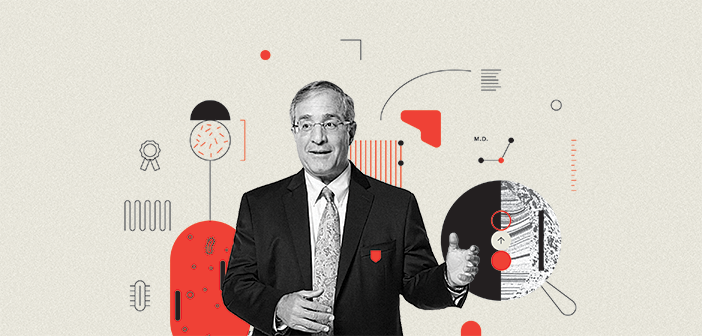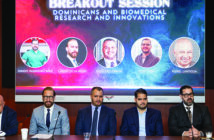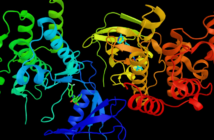Research dollars, new programs, top recruits. All measures of success, but not what matters most to the outgoing dean.
Your track record at Brown is one of exceptional success. What are you most proud of?
I’m proud of all the things we’ve accomplished. When I got here, the Medical School was sort of at a crossroads. We had to decide what kind of school of medicine we wanted to be. I felt very strongly that it needed to be an academically rigorous place that asks and answers questions and improves knowledge and improves care. So I’m really very excited about all the things that we’ve done to increase the level of academics, the level of research, the level of student participation in research at the undergraduate Program in Biology, the Medical School, and at the Graduate School. This is a different school than it was in 2013.
What did you enjoy the most?
I enjoyed anything that improved the experience for even a single student. I’ll give you an example: the idea that we would not have an MD/PhD program. That we would have students come to Brown through the PLME, where they’re locked into going to Medical School, but they don’t have the ability to be in an MD/ PhD program if they want to be and are qualified to be was just wrong. Anything that we could do to improve the experience, whether it’s forming the MD/PhD program with support from The Warren Alpert Foundation or improving the grants and the quality of the grants that we have so that people could have better research experiences. Anything we can do that improves the opportunities for the students to have world-class experiences on the scientific side, on the clinical side, on the community outreach side—all of those things are very exciting. One of the most interesting questions I was asked when I first got here—and maybe it was even you who asked me—was, what do you want to accomplish? What it came down to, I realized, is that each student had to find their passion. But once you go there, once you say each student has to find their passion, you then very quickly go to, then we have to be world class in all these different areas.
Is there something that you haven’t quite finished or you wish was further along?
There’s still a lot to do. We still have a lot to do in community outreach. We just got another grant from The Warren Alpert Foundation to start community clinics. I would love to be able to watch that and see where it goes. There is still a tremendous amount to do with this place if the right vision is carried out. This could be a top-10, top-20 medical school in the United States.
What would your advice be to the new dean?
I would hope that the new dean will carry on the policy of striving for excellence in all areas. I would hope that the new dean would understand the need to be excellent so that the students can have the kind of experiences that they want to have. On the flip side, the new dean has to follow his or her vision and his or her passion and may take us in new and exciting directions.
What are you looking forward to in your roles after you leave the deanship, in the senior health adviser role or in your own research?
In the senior health adviser area I want to help Brown, Lifespan, and Care New England come together in an integrated way. It’s a very important undertaking, and if that doesn’t happen for whatever the reason, the ability of Brown to get to that next level is going to be diminished. It would be a shame. If that does happen, it will also have an impact on Rhode Island and Providence. I’ve always said that I look forward to being able to look out the window from the dean’s office and see a whole mess of biotech startups in the region. I will have to be invited to the dean’s office in the future, but we have the opportunity to have the Jewelry District in Providence be part of the biotech revolution that’s happening in Boston and Cambridge. That would be just wonderful for the city, for the state, for everybody. But it will require the force of Lifespan, Care New England, and Brown all moving in the same direction.
What about your own research on pulmonary disease?
Our research is going very well despite the fact that I have very little time for it. I’ve worked with some of the people that are in my lab now for 25 years. We’ve made tremendous progress in therapeutics and cancer and in therapeutics and pulmonary fibrosis. We also have a new collaboration with researchers at Weill Cornell. We formed two companies this past year and we have a company now going through an initial public offering. It’s taken us about a year and a half to get it to this point. So I’m planning to do whatever helps Brown and whatever helps the Medical School, to work in my research lab, and to work hard on these new companies, which could have tremendous implications in terms of new therapeutics for lung cancer and glioblastoma multiforme, and a new vaccine for malaria. We have a third asset from a lab at Stanford that treats inflammation in the body. Most of the time when you hear about someone making a new company, it’s usually a drug and one target and one disease or a drug and related drugs against one disease and similar diseases. We did our company differently. We have different kinds of assets and we are getting investments in an earlier stage, moving them along, letting them go out as new companies, and then taking in new assets at the other side. So we’re changing the paradigm for how one takes something from academics and moves it into the entrepreneurial space and if we’re successful, it’s going to change all of biotech.
Do you have anything non-work-related that you’re looking forward to doing?
I’m looking forward to being able to go hiking when I want. My wife, Sandy, and I like to go to Maine to Acadia National Park. We have our favorite trails and our favorite spots and I’m looking forward to having a little more time to do the things that we enjoy.




